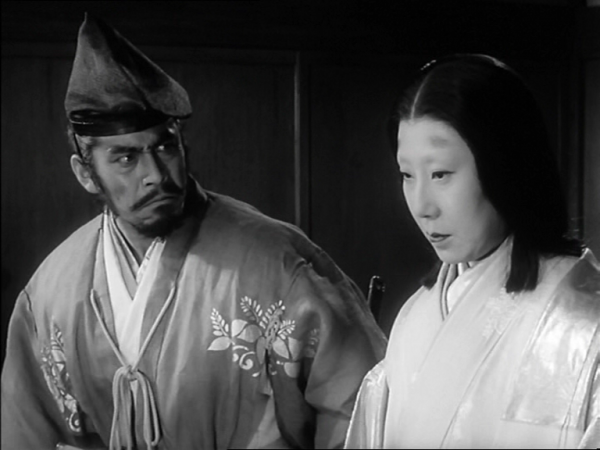
Washizu (Toshirô Mifune) and his wife, Asaji (Isuzu Yamada), reimagine Shakespeare’s MACBETH in Kursosawa classic THRONE OF BLOOD
THRONE OF BLOOD, AKA MACBETH (KUMONOSU JÔ) (Akira Kurosawa, 1957)
Anthology Film Archives
32 Second Ave. at Second St.
Thursday, November 21, 9:15; Sunday, November 24, 3:45; and Sunday, December 1, 5:30
Series runs November 20 – December 1
212-505-5181
www.anthologyfilmarchives.org
 Akira Kurosawa’s marvelous reimagining of Macbeth is an intense psychological thriller that follows one man’s descent into madness. Following a stunning military victory led by Washizu (Toshirô Mifune) and Miki (Minoru Chiaki), the two men are rewarded with lofty new positions. As Washizu’s wife, Asaji (Isuzu Yamada, with spectacular eyebrows), fills her husband’s head with crazy paranoia, Washizu is haunted by predictions made by a ghostly evil spirit in the Cobweb Forest, leading to one of the all-time classic finales. Featuring exterior scenes bathed in mysterious fog, cinematographer Asakazu Nakai’s interior long shots of Washizu and Asaji in a large, sparse room carefully considering their next bold move, and composer Masaru Sato’s shrieking Japanese flutes, Throne of Blood is a chilling drama of corruptive power and blind ambition, one of the greatest adaptations of Shakespeare ever put on film Throne of Blood is screening November 21, November 24, and December 1 as part of the Anthology Film Archives series “The Middle Ages on Film: Shakespeare,” consisting of ten cinematic adaptations of several of the Bard’s history plays, set in the Middle Ages, including Laurence Olivier’s Henry V, Roman Polanski’s Macbeth, Orson Welles’s Chimes at Midnight, and Peter Brook’s King Lear. The twelve-day festival was curated in collaboration with professor and scholar Martha Driver, who notes, “Through film, Shakespeare’s Middle Ages are not lost but revived and revitalized in translation. And much of what we think we know about the medieval period has been shaped by Shakespeare, the plays and film adaptations living on in our memories more vividly perhaps than the history books’ accounts.”
Akira Kurosawa’s marvelous reimagining of Macbeth is an intense psychological thriller that follows one man’s descent into madness. Following a stunning military victory led by Washizu (Toshirô Mifune) and Miki (Minoru Chiaki), the two men are rewarded with lofty new positions. As Washizu’s wife, Asaji (Isuzu Yamada, with spectacular eyebrows), fills her husband’s head with crazy paranoia, Washizu is haunted by predictions made by a ghostly evil spirit in the Cobweb Forest, leading to one of the all-time classic finales. Featuring exterior scenes bathed in mysterious fog, cinematographer Asakazu Nakai’s interior long shots of Washizu and Asaji in a large, sparse room carefully considering their next bold move, and composer Masaru Sato’s shrieking Japanese flutes, Throne of Blood is a chilling drama of corruptive power and blind ambition, one of the greatest adaptations of Shakespeare ever put on film Throne of Blood is screening November 21, November 24, and December 1 as part of the Anthology Film Archives series “The Middle Ages on Film: Shakespeare,” consisting of ten cinematic adaptations of several of the Bard’s history plays, set in the Middle Ages, including Laurence Olivier’s Henry V, Roman Polanski’s Macbeth, Orson Welles’s Chimes at Midnight, and Peter Brook’s King Lear. The twelve-day festival was curated in collaboration with professor and scholar Martha Driver, who notes, “Through film, Shakespeare’s Middle Ages are not lost but revived and revitalized in translation. And much of what we think we know about the medieval period has been shaped by Shakespeare, the plays and film adaptations living on in our memories more vividly perhaps than the history books’ accounts.”